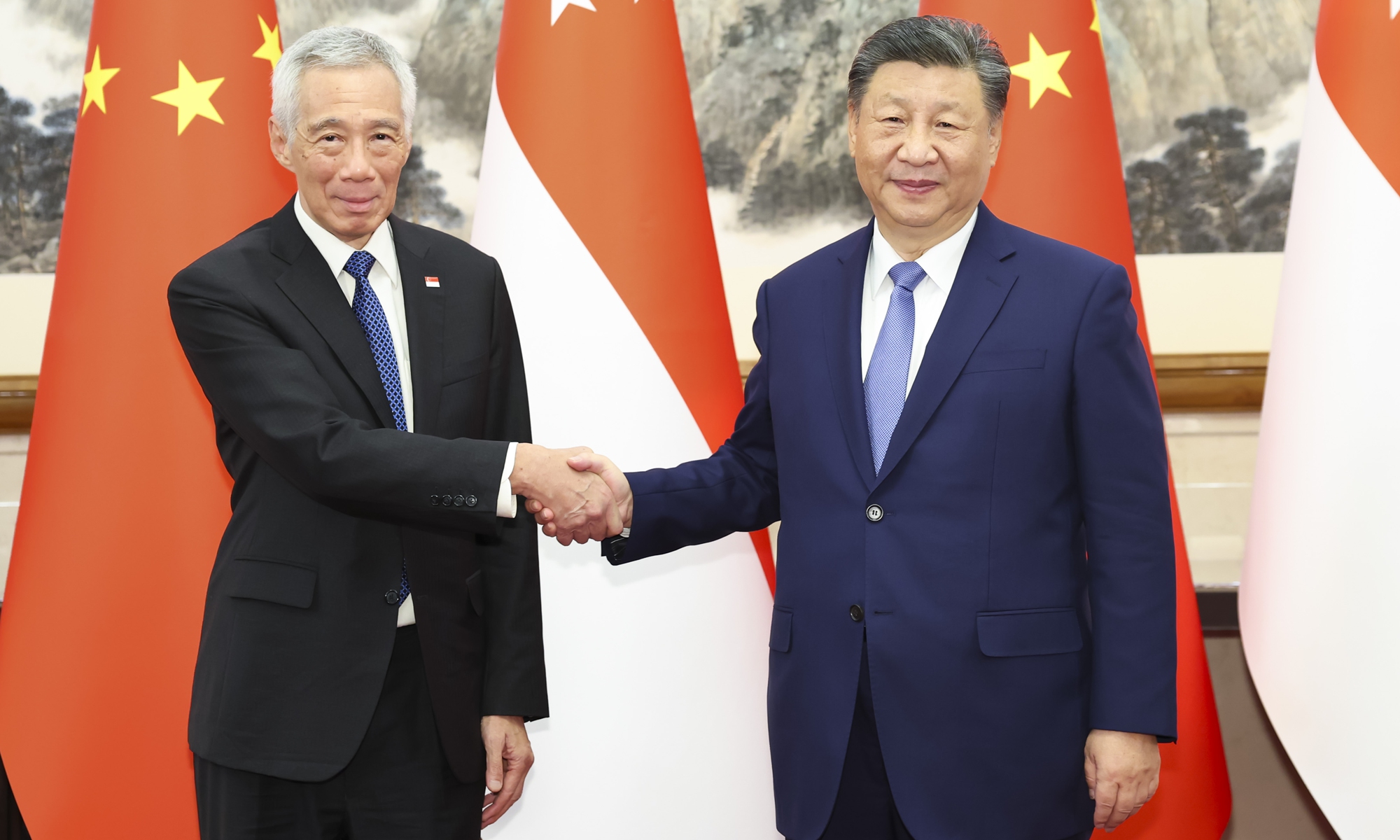Lee Hsien Loong's remarks also meant for some people in international community: Global Times editorial

Chinese President Xi Jinping meets with Senior Minister of Singapore Lee Hsien Loong at the Diaoyutai State Guesthouse in Beijing, capital of China, Nov. 26, 2024. (Xinhua/Huang Jingwen)
Chinese President Xi Jinping met with Senior Minister of Singapore Lee Hsien Loong in Beijing on Tuesday afternoon. It is Lee's first visit to China as senior minister since he stepped down as prime minister in May this year. Commending the remarkable achievements Singapore made during Lee's tenure as prime minister, Xi spoke highly of Lee's long-time support for China-Singapore cooperation. As one of the foreign leaders who has visited China the most, Lee's visit as an old friend holds special significance for the bilateral ties between China and Singapore, as well as for the relations in the regional and global contexts.Xi pointed out that this year marks the 30th anniversary of the China-Singapore Suzhou Industrial Park (SIP) in East China's Jiangsu Province. Over the past 30 years, the SIP has transformed from low-lying farmland into a township housing high-tech industries, representing a vivid example of bilateral cooperation and bearing witness to Singapore's deep involvement in China's reform and opening-up. When participating in the SIP's 30th anniversary commemorative event, Lee said Singapore continues to have confidence in China's future, stating that it would be short-sighted and unwise to write off China. He emphasized that China's development is a long-term project and that the Chinese economy still has growth potential. He also stressed that no one should underestimate the Chinese people's determination for their nation to succeed and stand tall in the world.
Over the past decades, many countries have benefited from China's development and formed inseparable ties with the country, with Singapore playing a deeply involved role in China's reform and opening-up, allowing the country to view China's economic trajectory from an objective and rational perspective. The shared sentiment of having developed alongside China, a rational understanding of China's current relationships with the world, and confidence in China's future are common among many countries, including Singapore. Lee's comments were not only addressed to the audience present but also to some international voices who may hold different views.
We have observed that leaders from regional countries such as Singapore, Indonesia, and Malaysia have explicitly voiced their opposition to "decoupling and supply chains disruption" and taking sides. At heart, they do not agree with certain countries' denial of China's development achievements, their unreasonable containment and suppression of China, "China collapse" theory or "Peak China" rhetoric.
Next year marks the 35th anniversary of diplomatic relations between China and Singapore. Over the past three decades, the close cooperation between the two countries has not only achieved remarkable economic results but also strengthened mutual political trust, setting a model for China's relations with ASEAN countries. From a globalization perspective, the success of China-Singapore cooperation over the past 30-plus years is also a testament to the success of economic globalization. By leveraging the opportunities brought by trade and investment liberalization and facilitation during the wave of globalization, the two countries have expanded their areas of collaboration. Amid a sluggish global economy, China and Singapore emphasize the importance of regional cooperation, reaffirming their commitment to economic globalization and opposing trade protectionism. In the face of geopolitical tensions, the two nations have joined hands to uphold multilateralism, jointly promote regional peace and stability, and provide a model of cooperation for addressing global challenges.
The development of China-Singapore relations is symbolic. Regardless of how the international landscape evolves, China's persistence in being a good neighbor and partner to its surrounding countries will never change.
Former Singaporean foreign minister George Yeo Yong-Boon, in a recent speech at Cambridge University, remarked that the Americans are mistaken if they think that when the Chinese economy grows, its behavior will be like that of a Western imperial power; when the Chinese say, "We have no imperial desires because this is not in our nature," it is true. This trust in China is widely recognized among regional countries. Conversely, inciting division and confrontation in the region, or forming small cliques to exclude China, directly opposes the shared interests and mutual understanding of regional nations and is bound to face strong resistance.
During the meeting with Lee, Xi welcomed Singapore to continue being a forerunner in cooperation with China, advance major cooperation projects, seize the opportunities brought by digital and green development, and write a new chapter in bilateral cooperation in the new era. In fact, for regional countries, having confidence in China and a willingness to stand alongside it reflect the trust in China's development. This confidence also signifies faith in their own development and hope for regional and global cooperation.


